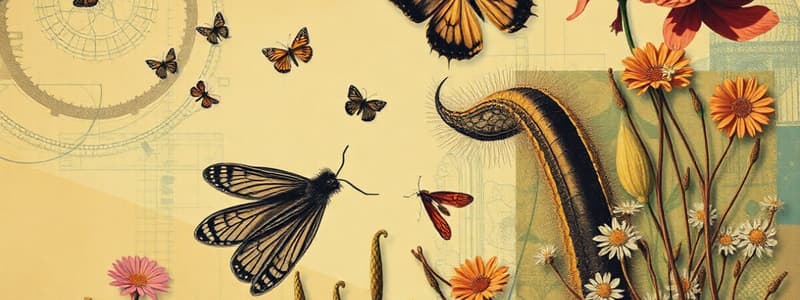Podcast
Questions and Answers
What does cell theory state about cells?
What does cell theory state about cells?
- Cells can arise spontaneously from non-living matter.
- All cells can function independently.
- Cells are the building blocks of all living things. (correct)
- Only certain organisms are made of cells.
Which sub-discipline of biology focuses on the study of heredity and genes?
Which sub-discipline of biology focuses on the study of heredity and genes?
- Genetics (correct)
- Evolutionary Biology
- Microbiology
- Ecology
Which process is essential for green plants to produce food?
Which process is essential for green plants to produce food?
- Photosynthesis (correct)
- Respiration
- Decomposition
- Fermentation
What hierarchy is used for biological classification?
What hierarchy is used for biological classification?
Which of the following is a process that all living organisms use to release energy?
Which of the following is a process that all living organisms use to release energy?
Which sub-discipline examines microorganisms and their effects on life?
Which sub-discipline examines microorganisms and their effects on life?
What are the two main types of reproduction in organisms?
What are the two main types of reproduction in organisms?
What is the focus of evolutionary biology?
What is the focus of evolutionary biology?
Flashcards are hidden until you start studying
Study Notes
Definition of Biology
- Study of living organisms and their interactions with the environment.
- Branches into various sub-disciplines.
Main Sub-disciplines
-
Cell Biology
- Study of cells, their physiological properties, structure, organelles, interactions, and behavior.
-
Genetics
- Study of heredity, variation, and the role of genes in organisms.
-
Evolutionary Biology
- Focus on the processes that drive evolution and the history of life on Earth.
-
Ecology
- Study of ecosystems, interactions between organisms, and their environment.
-
Physiology
- Study of the functions and mechanisms in a living system.
-
Microbiology
- Study of microorganisms, their impact on human life and the environment.
-
Botany
- Study of plants, their structure, properties, and biochemical processes.
-
Zoology
- Study of animals, including their behavior, physiology, and classification.
Fundamental Concepts
-
Cell Theory
- All living things are made of cells.
- The cell is the basic unit of life.
- All cells arise from pre-existing cells.
-
Homeostasis
- Ability of an organism to maintain stable internal conditions despite external changes.
-
Metabolism
- Set of life-sustaining chemical reactions in organisms, including:
- Anabolism (building up)
- Catabolism (breaking down)
- Set of life-sustaining chemical reactions in organisms, including:
-
Gene Theory
- Traits are inherited through genes, which are passed from parents to offspring.
Biological Classification
- Organisms are classified using a hierarchical system:
- Domain
- Kingdom
- Phylum
- Class
- Order
- Family
- Genus
- Species
Key Biological Processes
-
Photosynthesis
- Process by which green plants and some organisms use sunlight to synthesize foods with carbon dioxide and water.
-
Respiration
- Process of breaking down glucose to release energy, used by all living organisms.
-
Reproduction
- Process by which organisms produce offspring. Can be sexual or asexual.
Important Biological Tools
-
Microscopy
- Techniques for magnifying small samples.
-
Molecular Biology Techniques
- Techniques like PCR (Polymerase Chain Reaction) and electrophoresis for analyzing DNA.
-
Bioinformatics
- Application of computer technology to manage biological information, particularly in genomics and proteomics.
Current Trends in Biology
-
Genetic Engineering
- Manipulation of an organism's DNA to modify its traits.
-
Synthetic Biology
- Design and construction of new biological parts, devices, and systems.
-
Conservation Biology
- Study focused on protecting and preserving biodiversity.
-
Biotechnology
- Use of living systems and organisms to develop products, ranging from pharmaceuticals to biofuels.
Definition of Biology
- The study of living organisms and their interactions with the environment.
- Biology encompasses many sub-disciplines, each focusing on a specific aspect of life.
Main Sub-disciplines
- Cell Biology: Explores cells, their structure, organelles, interactions, and behavior.
- Genetics: Focuses on heredity, variation, and the role of genes in organisms.
- Evolutionary Biology: Investigates the processes driving evolution and the history of life on Earth.
- Ecology: Studies ecosystems, interactions between organisms, and their environment.
- Physiology: Focuses on the functions and mechanisms within a living system.
- Microbiology: Studies microorganisms, exploring their impact on human life and the environment.
- Botany: Focuses on plants, their structure, properties, and biochemical processes.
- Zoology: Studies animals, encompassing their behavior, physiology, and classification.
Fundamental Concepts
- Cell Theory: All living things are composed of cells, the basic unit of life. Cells arise from pre-existing cells.
- Homeostasis: The ability of an organism to maintain stable internal conditions despite external changes.
- Metabolism: The set of life-sustaining chemical reactions in organisms, including anabolism (building up) and catabolism (breaking down).
- Gene Theory: Traits are inherited through genes, passed from parents to offspring.
Biological Classification
- Organisms are classified hierarchically:
- Domain
- Kingdom
- Phylum
- Class
- Order
- Family
- Genus
- Species
Key Biological Processes
- Photosynthesis: Green plants and some organisms use sunlight to synthesize food from carbon dioxide and water.
- Respiration: All living organisms break down glucose to release energy.
- Reproduction: Organisms produce offspring; can be sexual or asexual.
Important Biological Tools
- Microscopy: Techniques for magnifying small samples.
- Molecular Biology Techniques: Techniques like PCR (Polymerase Chain Reaction) and electrophoresis are used to analyze DNA.
- Bioinformatics: Uses computer technology to manage biological information, particularly in genomics and proteomics.
Current Trends in Biology
- Genetic Engineering: Manipulation of an organism's DNA to modify its traits.
- Synthetic Biology: Designs and constructs new biological parts, devices, and systems.
- Conservation Biology: Focuses on protecting and preserving biodiversity.
- Biotechnology: Uses living systems and organisms to develop products ranging from pharmaceuticals to biofuels.
Studying That Suits You
Use AI to generate personalized quizzes and flashcards to suit your learning preferences.




